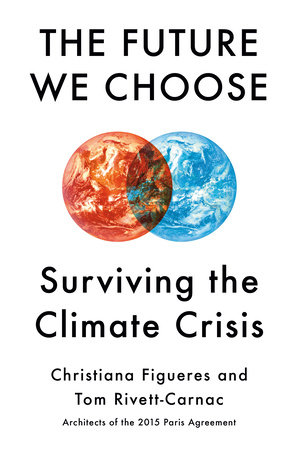How to Talk to Your Children About Climate Change
by Christiana Figueres and Tom Rivett-Carnac
Both of us have always talked to our children about climate change. This is not unusual for the minority of people who have dedicated their working (and personal!) lives to tackling the climate crisis. But we recognize that many parents are now becoming increasingly aware of climate change and its consequences – worsening floods and storms, devastating fires, and changes to communities are all signs of a changing climate. These frequent and frightening events cause feelings of fear, helplessness, and hopelessness. That is why we wrote The Future We Choose: Surviving the Climate Crisis — to help with practical and empowering tools to understand what we’re facing and how each of us can play our part.
Not only do adults have questions about how to play their part, but children hear about climate change at school, in the news, and — if they’re old enough — on social media, too. Here are a few tips for starting a conversation about climate change that you might find helpful.
It’s Not Too Late
Climate change is happening, but we’re still able to stave off the worst and manage the long-term effects of it if we act in the next decade to radically reduce the pollution that comes from our houses, cars, and industries. At the same time, we also have to regenerate nature – it’s the best way to relocate the pollution, taking it out of the air and putting it back in the soil where it belongs. Trees and soils can absorb a lot of the carbon pollution that causes global warming. We have to protect the forests, wetlands, mangroves, and the ocean; as well as try to undo the damage of the past 100 years as fast as possible.
Our generation is at an important point in human history. We are the first generation to have all we need to tackle climate change. We have the science, the technology, and the resources to build a zero carbon future where we breathe clean air and can gather freely with each other; where our energy, food production, building, and transportation systems have been re-made. Our clean future is one without burning coal or the internal combustion engine, but with millions of new jobs in electric vehicles, renewable energy, and more. We can not only survive, but we can thrive.
Science Over Opinions
Importantly, we should always listen to science and not to personal opinions. We should make sure that what leaders, the media, friends, and relatives say about climate change is supported by the most respected scientists. Just as we listen to the scientific experts who tell us it’s best to stay home to ‘flatten the curve’ of the COVID-19, we should also listen to the scientists that are telling us to stop polluting to bend the curve of carbon pollution and keep it going down.
Make a Family Plan
The past cannot be undone, but the future is unwritten. Make a decision and determine your plan as a family to reduce your emissions. Individually and collectively we can change the story we tell ourselves about climate change when we recognize the scale of the challenge and decide to play our part. From our experience, your kids will be the best inspiration for doing so – and they’ll hold you accountable.
Looking around us at the current health pandemic that has caused the world to pause, we see tragedy and heartache. But we also see immense courage, kindness, and solidarity. These are the very same attributes that can help to shift our collective narrative on climate change.
So take a deep breath, and together we can build a beautiful future.
About the Authors
Christiana Figueres was Executive Secretary of the UN Framework Convention on Climate Change from 2010-2016, and one of the architects of the 2015 Paris Agreement, the first global treaty on climate change unanimously signed by 195 countries. She is the co-founder of Global Optimism, co-presenter of the podcast, Outrage and Optimism, and the co-author of the new bestselling book, The Future We Choose: Surviving the Climate Crisis.
Tom Rivett-Carnac served as Senior Political Advisor to Christiana Figueres at the UNFCCC, credited with leading a new collaborative diplomacy that was vital to the achievement of the Paris Agreement. Along with Christiana Figueres, he is co-founder of Global Optimism, co-presenter of Outrage and Optimism, and the co-author of The Future We Choose: Surviving the Climate Crisis.

